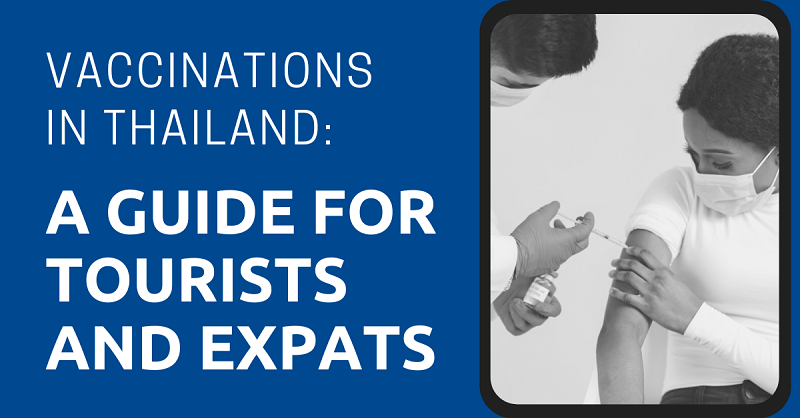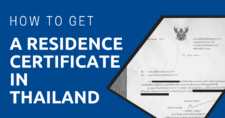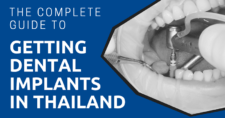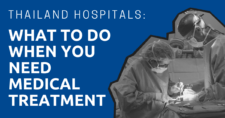
The adage “Prevention is better than cure” from Desiderius Erasmus, (1466 – 1536), is frequently heard some 500 years after the phrase was coined. Medical science and research focuses on anything and everything to do with the human body, and this has undoubtedly increased human lifespan.
Prevention by vaccination, for example, for many deadly and debilitating diseases has been integral. In the last 200 years, life expectancy in the West has doubled and is now higher than 80 years. Let’s think for a moment of the consequences if a vaccine for Polio or Smallpox had never been found.
"*" indicates required fields
Disclaimer: This article may include links to products or services offered by ExpatDen’s partners, which give us commissions when you click on them. Although this may influence how they appear in the text, we only recommend solutions that we would use in your situation. Read more in our Advertising Disclosure.
Contents
However, it is easy to get confused about which vaccinations are needed when traveling to or living in Thailand. Picking your way through websites, social media, and various expat forums often yields conflicting information.
Outbreaks of diseases or viruses may be blown out of proportion or down-played. You may read harrowing stories of people bitten by the wild dogs of Thailand, or coming across the debilitating effects of Dengue Fever, or even dying from Tetanus.
Some people don’t believe in immunization. Others feel like the medical profession over-prescribes. Yet some people will ardently follow doctors’ recommendations.
Thailand is one of the top-ten most visited countries in the world and welcomes over 32 million visitors a year. It offers a huge diversity of activities such as trekking through the jungle, lazing in luxury seaside resorts, staying in quiet villages or mountain hideaways, or thriving in heaving city life.
Thailand sits between the Equator and the Tropic of Cancer, resulting in a tropical climate often described as hot and humid, with a definite monsoon season.
Living or vacationing in the tropics may expose people to diseases and viruses that aren’t prevalent in their home country.
We have developed this guide to help you make informed decisions about vaccinations.
In saying that, we live in an ever-changing world. New viruses come to the fore, or some almost eradicated may flare up again.
Research carefully and check with your health professional before you travel.
So, how do you decide what is best for you?
Things to Consider
When you enter Thailand, currently you’re not required to produce a vaccination history. However, if you’re planning to live in Thailand, some visas will require you to get a medical assessment and health certificate stating that you aren’t carrying specified conditions or diseases.
Otherwise, here are a few things to consider:
Where you visit or live: If you live or plan on visiting Bangkok you probably won’t need a Malaria vaccine, but if you’re planning on trekking through the jungle or living in remote areas it would probably be a good idea.
Age: Different vaccinations may apply to different age groups. For example, Shingles vaccinations are recommended for people over fifty.
Vaccination history: What vaccines did you get as a child? Are your Tetanus and Hepatitis vaccines up to date?
Health Warnings: Keep abreast of updated travel warnings by visiting the Center for Disease Control, Smart Traveller Australia, and Travel Health Pro UK.
Diseases in Thailand
First things first. Check to see if you have the following vaccines. If not, it might be time to get your children or your vaccines or boosters.
The Center for Disease Control, or CDC, recommends that you have your routine vaccinations up to date. Often, these are given to children. However some people decide not to immunize their children.
Although a disease or virus may be almost unheard of in your home country, that may not be the case in Thailand. Also, some vaccinations like the flu vaccine are recommended annually and other vaccines like the tetanus booster every ten years.
Routine childhood vaccines include:
- Hepatitis B
- Rotavirus
- Diphtheria, Tetanus, and Pertussis (Whooping Cough)
- Hib – Haemophilus Influenzae Type b
- Pneumococcal – Pneumococcal Conjugate (PCV13) VIS
- Polio
- Flu
- MMR – Measles, Mumps, & Rubella
- Chickenpox
- Hepatitis A
- Meningococcal
- HPV (Human Papillomavirus) VIS
And adult routine vaccines include:
- Flu
- Td (Tetanus, Diphtheria)
- Tdap (Tetanus, Diphtheria, Pertussis)
- HPV
- Shingles
- Pneumococcal
- Meningococcal
- Hepatitis A
- Hepatitis B
Let’s take a closer look at specific vaccination recommendations for Thailand.
Hepatitis A
Hepatitis A is a disease that affects the liver and may be a mild illness or lead to serious lifelong illness. Hepatitis A may be acquired through contaminated food or water in Thailand, regardless of where you are eating or staying. Accordingly, each agency recommends vaccination.
Hepatitis B
Hepatitis B is a virus transmitted through body fluids. It may be acquired through sexual contact, contaminated needles, and blood. Some people may have fever, tiredness, loss of appetite, nausea, vomiting, stomach pain, lasting up to several months. Others may develop chronic Hepatitis B, causing early death from liver disease and liver cancer.
Typhoid
Typhoid fever is a serious disease also spread by contaminated food and water. Symptoms include lasting high fevers, weakness, stomach pains, headache, and loss of appetite. Internal bleeding and death can occur but are rare. There is high risk of Typhoid in South Asia. According to CDC, the Typhoid vaccine is only 50% to 80% effective.
Japanese Encephalitis
Japanese Encephalitis is spread through mosquito bites and symptoms may take five to fifteen days to develop. Symptoms include fever, headache, vomiting, confusion, and difficulty moving. It may develop later with swelling around the brain and can lead to coma and death. You’re at higher risk if you are traveling to rural areas or if you’ll be traveling a long time.
Rabies
Rabies is a virus spread in the saliva of infected animals. People may become infected from licks, bites, or scratches from infected dogs, cats, or other animals.
It affects the central nervous system, ultimately causing brain disease and death and once symptoms appear the disease is nearly always fatal. If you are planning on working with wild or domestic animals, spending a lot of time outdoors or in locations where there are a lot of street dogs and cats, then being vaccinated is strongly recommended.
Malaria
Malaria is spread through mosquito bites. Symptoms include high fevers, shaking, chills, and flu-like illness. Without treatment, Malaria can cause severe illness and even death. There are several vaccines on the market, and you need to take these in advance of your travel as well as upon return.
Yellow Fever
There is no risk of Yellow Fever in Thailand. However, if you are arriving from an African, Central, or South American country with risk of Yellow Fever, you may be required to present proof of vaccination on entry to Thailand.
Tuberculous (TB)
Tuberculous is present in Thailand. It is an infectious disease spread through the air when infected people who have active TB in their lungs cough, sneeze, speak or spit. If it is left untreated the disease can be fatal.
Cholera
Cholera is a bacterial infection transmitted by contaminated food and water. Cholera can cause severe watery diarrhea although mild infections are common. Left untreated, it can result in severe dehydration, and in some cases death. Most travelers are at low risk.
Dengue
Dengue Fever is endemic throughout Thailand with large outbreaks occurring every few years. While cases occur year-round, the rainy season is the peak transmission period. Symptoms may be mild to severe flu-like conditions and can result in death.
A vaccine has been developed and is available for people aged 9 to 45 years but they must be living in endemic area. And it’s not recommended for people who’ve never had Dengue Fever. This particular mosquito is active during the day time–so cover up.
Zika
Zika is endemic in Thailand, however the risk to travelers is believed to be low. It can be transmitted by mosquito and through sex with an infected person. Zika causes birth defects in pregnant women and CDC recommends pregnant women should not travel to Thailand or they should take strict precautions while in Thailand. There isn’t a vaccine currently available.
Recommended Vaccines
A vaccination program will depend on your itinerary while in Thailand. The Tropical Medical Bureau recommends all travelers should have at least vaccines for Tetanus, Hepatitis A, and Typhoid.
| Vaccine | Staying in the Cities | Exploring Rural Thailand | Visiting Border Regions | Hiking and Trekking |
| Tetanus | ✓ | ✓ | ✓ | ✓ |
| Typhoid | ✓ | ✓ | ✓ | ✓ |
| Hepatitis A | ✓ | ✓ | ✓ | ✓ |
| Hepatitis B | ✓ | |||
| Meningococcal | ✓ | |||
| Tuberculosis | ✓ | |||
| Japanese Encephalitis | ✓ | |||
| Malaria | ✓ | |||
| Rabies | ✓ | |||
| Dengue Fever | Optional | Optional | Optional | Optional |
Costs
If you’re living in Thailand and need vaccinations, check your local hospital or clinic.
If you’re in Thailand, go to one of these hospitals. They have a dedicated vaccination clinic where you’re sure to get the right vaccine.
To give you an idea of costs, Thai Travel Clinic indicates the following prices based on one dose of the vaccine.
You’ll need to pay for the consultation fee as well, which is about $3.15.
- Japanese Encephalitis: $16
- Hepatitis A and B: $32
- Meningococcal conjugate: $71
- Tetanus + Diphtheria (dT): $3
- Typhoid: $10
If you’re not yet in Thailand, the cost of vaccines does vary between countries. The following provides some range of costs in US Dollars, excluding medical consultation fees. If you have insurance, your vaccines will be covered–aside from the co-pay.
- Hepatitis A: under the NHS, UK is free, compared to $65 in the US and $100 in Australia
- Typhoid: available free of charge in the UK, whereas it costs around $75 in the US
- Hepatitis B: ranges from about $50 in Australia to about $120 in the UK
- Japanese Encephalitis: around $260 in Australia or the UK, and up to about $360 in the US
- Malaria: Malarone tablets are about $3.85 per tablet in Australia
- Rabies: averages $200 for the course
When to Get Vaccinated
Well in advance of your departure, check the CDC disease and vaccination list. Ideally, visit your doctor four to six weeks before your trip, as you may need to commence taking vaccines before you leave. For example, anti-malaria medication and Hepatitis vaccines may be started as early as two months prior to your trip.
Avoiding Diseases
In addition to being immunized for illnesses and diseases relevant for your travel plans, age, medical history, and condition, you can further minimize exposure to risks by doing the following:
Eat and Drink Safely
Thailand is renowned for its wonderful food, and there are thousands of street stalls and markets offering all sorts of delicious treats. However contaminated food and water can cause traveler’s diarrhea and other gastrointestinal illnesses such as Typhoid and Hepatitis A.
- Food: CDC recommends consuming food that is properly cooked and served hot, ensuring fruit and vegetables are washed in clean water, avoiding food from street vendors, not consuming unpasteurized dairy products, and not eating “bush-meat” (monkeys, bats, or other wild game).
- Water: Presume water from any tap, well, or other local sources, as non-potable. Use bottled or treated water for consumption and when brushing your teeth and rinsing your mouth. Never assume that ice is made from filtered water.
Prevent Insect Bites
Some viruses and illnesses in Thailand are contracted by insects, particularly mosquitoes. Here are some insect avoidance tips.
- Sleep in insect-proof or air-conditioned rooms
- Wear long-sleeved clothing, long pants, and hats outdoors, day and night, especially at dawn and sunset
- Use permethrin-treated clothing and gear, such as boots, pants, socks, and tents
- Use personal repellents on exposed skin–the most effective mosquito and tick repellents contain DEET; look for a minimum 20%
- Avoid dark-colored clothing and strong scents such as perfume, aftershave, and perfumed cosmetics and deodorants as these may attract mosquitoes
- Ensure large amounts of standing water is not left around unnecessarily
Stay away from Animals
In Thailand there are many street dogs and cats that may not have been immunized. Generally, they don’t bother people unless they feel threatened or their territory has been invaded. Animal bites and scratches can lead to serious diseases such as Rabies. Even cute puppies, monkeys, cats, and bats can carry the disease, so avoid touching or feeding animals you don’t know. If you’re bitten or scratched seek medical advice immediately.
Avoid Sharing Body Fluids
Diseases and viruses such as Hepatitis B, HIV and Aids, and TB may be passed by the exchange of body fluids. Practice safe sex, don’t share needles, and ensure any medical instruments used are sterile.
Reduce Exposure to Germs
Good hygiene practices help you avoid sickness and spreading illnesses to others. Wash your hands often, especially before eating. Carry hand sanitizer containing at least 60% alcohol. Cover your mouth and nose with a tissue or your sleeve (not your hands) when coughing or sneezing. If possible avoid contact with people who are sick or if you’re sick.
Get Medical Care in Thailand
It’s important to keep a list of hospitals or medical clinics handy in case you get sick.
If you’re in Bangkok, our guide to private hospitals in Bangkok will help you.
Elsewhere in Thailand, particularly in cities, you’ll likely find Joint Commission Accredited JCI hospitals or you can get recommendations from other expats.
Costs for medical treatment and hospital stays can increase quickly. If you live in Thailand get adequate health insurance.
If you’re in Thailand on vacation, or plan on coming to Thailand for vacation, get travel insurance.
Now, on to You
If you plan on moving or traveling to Thailand you’ll want to be sure your vaccinations are up to date. If not, visit your doctor and get vaccinated.







